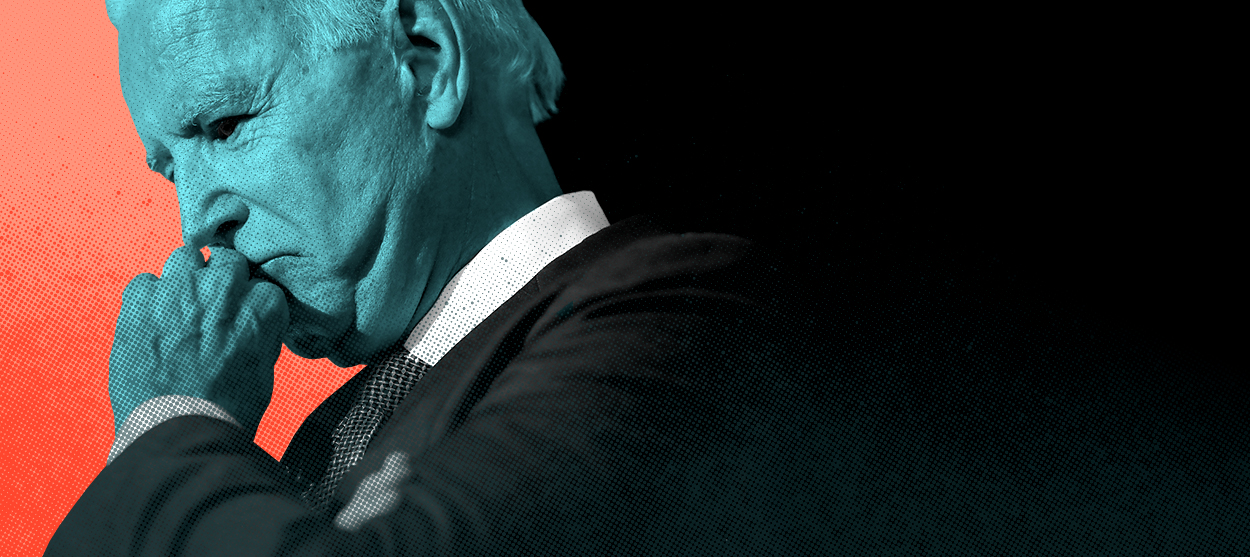The strongest case for Joe Biden
It's time to save democracy


A free daily email with the biggest news stories of the day – and the best features from TheWeek.com
You are now subscribed
Your newsletter sign-up was successful
I'm not thrilled with the prospect of Joe Biden winning the Democratic nomination and becoming president, and I know no one who is. That doesn't mean I hate him. It's just hard to get truly excited by a guy who's a milquetoast moderate, prone to embarrassing gaffes and verbal flubs, and showing undeniable signs of cognitive wear and tear as he approaches old age.
But there is a compelling case to be made for Biden — one that hasn't been clearly articulated by the candidate or his campaign. That's likely because the case is at bottom about process rather than policy substance, and process is out of fashion in our moment of tribal partisan feuds.
For all the energy spent over the past three years on ringing alarm bells about the threat that Donald Trump poses to American democracy, that threat has usually been put in terms of policies or evidence of corruption. He's closing the southern border! He scuttled the Iran Deal! He's too soft on Vladimir Putin! He's taking foreign bribes through Trump properties! He's abused his power by trying to extort a foreign leader to dig up dirt on a political rival! But here's the thing: The policies might be bad, but policies can be reversed. The corruption might be impeachable, but either way the Trump administration will eventually come to an end.
The Week
Escape your echo chamber. Get the facts behind the news, plus analysis from multiple perspectives.

Sign up for The Week's Free Newsletters
From our morning news briefing to a weekly Good News Newsletter, get the best of The Week delivered directly to your inbox.
From our morning news briefing to a weekly Good News Newsletter, get the best of The Week delivered directly to your inbox.
Where Trump is having a potentially longer-term detrimental impact is in continuing and expanding on ominous trends in democratic governance that precede him. I'm talking about the tendency of Democratic and Republican administrations alike to respond to the institutional gridlock that follows from intense partisan polarization by bypassing Congress' constitutionally designated role in passing laws, approving budgets, and authorizing war. That Congress has often been complicit in this tendency makes it no less troubling that governance increasingly involves a negotiation between the executive and judicial branches, with the legislature standing by passively on the sidelines.
When it comes to foreign policy, the pattern goes back a long way, arguably to Congress' failure to pass formal declarations of war in Korea and Vietnam, but certainly to the passing of the Authorization for the Use of Military Force (AUMF) shortly after the Sept. 11 attacks — an effective blank check that has allowed three presidents (two Republicans and one Democrat) to wage wars in a long list of countries across the Greater Middle East for nearly two decades now with minimal congressional oversight.
Beyond the issue of war powers, there's Barack Obama's decision to implement sweeping changes to immigration policy by executive order after Congress failed to pass its own immigration reform bill. President Trump has made many similar moves, most recently in attempting to reallocate various forms of congressionally approved military funding for use in the building of his border wall — a project that the House of Representatives (under first Republican, and now Democratic, control) has repeatedly failed to fund outright.
As if this wasn't enough, Democratic candidates for president have now begun to make promises about accomplishing a range of policy goals by way of executive orders. (California Sen. Kamala Harris liked to make such autocratic gestures while her campaign was active, and Massachusetts Sen. Elizabeth Warren does the same thing now.)
A free daily email with the biggest news stories of the day – and the best features from TheWeek.com
This is obviously an expression of frustration with divided government, which used to be rare but is now the norm. Each side in our politics desperately wants to do things. But neither has sufficient support in Congress to get them done, given the many veto points in the American political system. Hence the proliferation of efforts and promises to do end-runs around the Constitution.
Interestingly, the Democratic candidate with the most ambitious policy agenda of all, Vermont Sen. Bernie Sanders, doesn't typically talk this way. But that's at least in part because his message involves a promise to enact a "political revolution" that will presumably sweep progressive super-majorities into Congress with him, removing the need to work around legislative obstacles. Whether Sanders would refrain from attempting to govern by fiat if he found himself in the Oval Office facing a recalcitrant Congress that firmly blocked his trillions of dollars in spending proposals very much remains an open question.
That's where Biden comes in.
The former vice president's message is not a programmatic one. He's not ideologically devoted to a centrist agenda. (In several areas, he's running to Obama's left.) Rather's he's keenly aware that the United States is a sharply divided country, he believes he understands where many Republicans are coming from (even if he doesn't personally affirm their views), and he's committed to reaching common ground with them in attempting to govern the country.
In this respect, Biden isn't promising a straightforward restoration of the Obama administration. He's actually proposing that the country can return to something more like the consensus politics of the middle decades of the 20th century — a time when Democrat John F. Kennedy proposed a major tax cut, members of both parties came together to pass landmark civil rights legislation, and Republican Richard Nixon oversaw the creation of the Environmental Protection Agency and the expansion of affirmative action policies.
The case for attempting this form of governance is emphatically not that the outcome of some extended negotiation between President Biden and leading members of the congressional GOP will automatically produce the best policy. (Committed members of each party will sharply disagree about what the best policy is.) The case for attempting to reach bipartisan consensus is that, given how divided the country is, whatever emerges from such a process will be the best we can achieve under present circumstances.
In the best-case scenario, both sides as well as lots of independents would not only find something to like in what gets enacted into law through such a process. Their confidence in the institutions that produced this decent outcome would increase from its currently low level, making future policy accomplishments somewhat more likely. The country and its institutions would begin healing from the partisan traumas of recent years. Biden is the only candidate running for office who's holding out the prospect of such a path forward.
Now of course it's also possible, and perhaps likely, that this plan would fail — as countless Biden critics on the center-left and left have predicted it will. For one thing, a truly bipartisan policy may well please no one and so end up discrediting our institutions — along with efforts to bridge our country's deep divides — even further. Then there's the possibility that Republicans could demand that Biden come all the way over to the center-right in order to get a deal, thereby alienating a large portion of the Democratic Party, and then refuse to close the deal with him, leaving the president looking like a dupe. If Republicans place partisan advantage ahead of the attempt to govern in the name of the elusive common good, that's exactly the kind of move they'd make — like an enemy army that agrees to negotiations for a truce and then shoots the emissary sent to begin the talks.
That is certainly cause for concern and suspicion. Still, there is something admirable about Biden's willingness to propose an effort at improved self-government. Our system works badly under conditions of intense partisanship. The resulting breakdown in effectiveness then fuels further anger and polarization, prompting the downward spiral in which we find ourselves today, with presidents of both parties increasingly tempted by extra-constitutional power grabs.
What Joe Biden's proposing is a presidency devoted to nothing less than stopping our slow-motion drift toward authoritarianism.
Damon Linker is a senior correspondent at TheWeek.com. He is also a former contributing editor at The New Republic and the author of The Theocons and The Religious Test.
-
 6 exquisite homes with vast acreage
6 exquisite homes with vast acreageFeature Featuring an off-the-grid contemporary home in New Mexico and lakefront farmhouse in Massachusetts
-
 Film reviews: ‘Wuthering Heights,’ ‘Good Luck, Have Fun, Don’t Die,’ and ‘Sirat’
Film reviews: ‘Wuthering Heights,’ ‘Good Luck, Have Fun, Don’t Die,’ and ‘Sirat’Feature An inconvenient love torments a would-be couple, a gonzo time traveler seeks to save humanity from AI, and a father’s desperate search goes deeply sideways
-
 Political cartoons for February 16
Political cartoons for February 16Cartoons Monday’s political cartoons include President's Day, a valentine from the Epstein files, and more
-
 The ‘mad king’: has Trump finally lost it?
The ‘mad king’: has Trump finally lost it?Talking Point Rambling speeches, wind turbine obsession, and an ‘unhinged’ letter to Norway’s prime minister have caused concern whether the rest of his term is ‘sustainable’
-
 The billionaires’ wealth tax: a catastrophe for California?
The billionaires’ wealth tax: a catastrophe for California?Talking Point Peter Thiel and Larry Page preparing to change state residency
-
 Bari Weiss’ ‘60 Minutes’ scandal is about more than one report
Bari Weiss’ ‘60 Minutes’ scandal is about more than one reportIN THE SPOTLIGHT By blocking an approved segment on a controversial prison holding US deportees in El Salvador, the editor-in-chief of CBS News has become the main story
-
 Memo signals Trump review of 233k refugees
Memo signals Trump review of 233k refugeesSpeed Read The memo also ordered all green card applications for the refugees to be halted
-
 Has Zohran Mamdani shown the Democrats how to win again?
Has Zohran Mamdani shown the Democrats how to win again?Today’s Big Question New York City mayoral election touted as victory for left-wing populists but moderate centrist wins elsewhere present more complex path for Democratic Party
-
 Millions turn out for anti-Trump ‘No Kings’ rallies
Millions turn out for anti-Trump ‘No Kings’ ralliesSpeed Read An estimated 7 million people participated, 2 million more than at the first ‘No Kings’ protest in June
-
 Democrats: Harris and Biden’s blame game
Democrats: Harris and Biden’s blame gameFeature Kamala Harris’ new memoir reveals frustrations over Biden’s reelection bid and her time as vice president
-
 ‘We must empower young athletes with the knowledge to stay safe’
‘We must empower young athletes with the knowledge to stay safe’Instant Opinion Opinion, comment and editorials of the day
